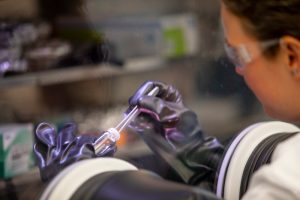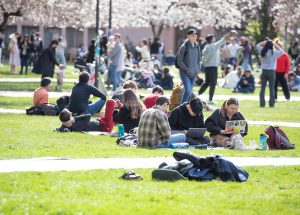The Graduate Program in Neuroscience offers first-year students an exposure to core principles of Neuroscience through a set of lecture and lab courses:
| CURRICULUM REQUIREMENTS | CREDITS |
|
Core Credits NEURO 501 – Introduction to Neurobiology I NEURO 502 – Introduction to Neurobiology II NEURO 503 – Cognitive and Integrative Neuroscience NEURO 504 – Biophysics of Nerve, Muscle, and Synapse NEURO 510 – Seminar in Neurobiology NEURO 515 – Teaching Practicum NEURO 526 – Introduction to Laboratory Research NEURO 527 – Current Topics in Neurobiology & Behavior NEURO 529 – Experimental Design & Grant Writing NEURO 545 – Quantitative Methods in Neuroscience NEURO 559 – Neurology of Disease |
47
(3) (5) (4) (3) (3) (6) (12) (3) (2) (3) (3) |
|
Elective Courses Elective Course with DEI focus |
12 (10) (2 MIN) |
| Dissertation (Neuro 800) | 31 |
| Total Credits Required | 90 |
Further information on core courses and electives can be found in the Student Handbook.
Students in our graduate program are expected to complete each component of the curriculum satisfactorily and to maintain an overall GPA of 3.0. The program also expects students to reach their academic milestones in a timely manner.
Lab Rotation
With over 140 faculty members, students in the Graduate Program in Neuroscience, have many choices for their dissertation lab. During the first year, students have the opportunity to rotate through either experimental labs, working with animals including worms, flies, zebrafish, mice, and primates, or computational labs, which primarily work with data and mathematical models. While gradate students often come in with an idea of a research direction they want to pursue, many students switch their focus or field based on interests they acquired while rotating through labs.
Teaching Practicum
The Graduate Program in Neuroscience ensures that students are provided with teaching experience in the basic concepts of neuroscience and related disciplines at the university level by pairing GPN students with an instructor who will provide mentoring and opportunities to lead classroom activities. The goal is that students will develop proficiency in teaching neuroscience to undergraduate and/or graduate students.
Students earn 6 academic credits by being a teaching intern for a class with a lab for one quarter OR receive 3 credits for a class without a lab for two quarters, OR teach and design the curriculum for NeuSci 450, a journal course for two quarters. These courses are in undergraduate Neuroscience courses, or Neuroscience related courses within the Medical School, Arts & Science, and other areas as approved by the Program Committee.
Skills exercised: In all courses, teaching interns will discuss exams and other evaluative procedures with instructors before administering assignments to the students enrolled in the course. Instructors and interns will predict the utility of the assignment, analyze the accuracy of their predictions during grading, assessing whether an alternate assignment would have served course students better. In all courses, teaching interns will receive written evaluation from the faculty instructors.
Supervisory Committee Meetings, Advancement to Candidacy and Graduation
Between the first and second year, students select a lab and a dissertation advisor. Before the start of the second year, students will work with their dissertation advisor to form a Supervisory Committee, consisting of 4-7 faculties to evaluate students’ academic progress.
Graduate students making normal progress in the program are expected to advance to candidacy for the Ph.D. in the third year. To advance, students prepare a document with 1) a brief research proposal (thesis proposal) and 2) answers to three short answer questions on prepared topics. The Supervisory Committee evaluates the written portion of the exam and, in an oral exam, assesses the student’s ability to answer questions about topics related to the area of the dissertation and general knowledge.
Students spend most of their remaining years finishing their research and writing the dissertation. The final exam is an oral defense of the thesis before the student’s Supervisory Committee in a public forum.


